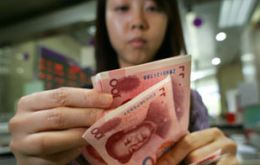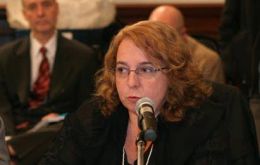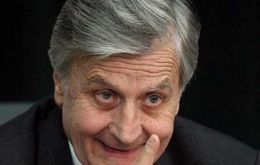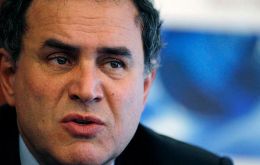MercoPress. South Atlantic News Agency
Tag: Inflation
-
Monday, June 27th 2011 - 15:09 UTC
Chinese local governments have piled a debt equivalent to 1.4 trillion USD

Fresh evidence shows that Chinese local governments commit the same sins as their counterparts in South America and even Spain, where most provinces, states and regional autonomies traditionally pile billions of dollars in debt that following some political arrangement are finally bailed out by the central government.
-
Monday, June 27th 2011 - 06:15 UTC
Central banks must raise interest rates to control inflation, says BIS

Central banks need to start raising interest rates to control inflation and may have to act faster than in the past according to the Bank of International Settlements.
-
Wednesday, June 15th 2011 - 23:35 UTC
Argentina’s official May ‘fantasy’ inflation 0.7%; private consultants, 1.5%

Inflation in Argentina reached 0.7% in May compared to the volume reported in the previous month, the Indec national statistics bureau announced on Wednesday. The official rate is less than half what was presented on Tuesday by opposition lawmakers, which they assured reached 1.5% and 23% in the last twelve months.
-
Wednesday, June 15th 2011 - 01:45 UTC
Argentine opposition says May inflation was 1.5% and 23.5% in last 12 months

Argentine opposition lawmakers reported Tuesday that the inflation rate reached 1.5% in May, according to the estimates provided by eight “censored” economic consultants. They added it was their duty to inform about data which “the government tries to hide from public opinion”.
-
Saturday, June 11th 2011 - 11:27 UTC
Cristina Fernandez presidential bid “is headed towards a predictable scenario”

The candidacy of Argentine President Cristina Fernandez de Kirchner “is headed towards a predictable scenario” assured Buenos Aires province Governor Daniel Scioli in an interview he granted to Ambito Financiero's new TV show, “Ambito de debate”.
-
Thursday, June 9th 2011 - 19:18 UTC
Euro central bank expected to increase interest rates next month

The European Central Bank (ECB) has signalled that it will raise interest rates next month, from 1.25%. Earlier on Thursday, the ECB kept rates unchanged for the second month in a row, after increasing them in April for the first time in almost two years.
-
Thursday, June 9th 2011 - 01:02 UTC
Organized labour leader Moyano admits “inflation in Argentina is a problem”

Argentina’s organized labour leader Hugo Moyano admitted Wednesday that “inflation in Argentina is a problem”. He also said that, despite the several criminal cases open against him, he is not afraid of going to jail.
-
Tuesday, June 7th 2011 - 23:06 UTC
Brazil inflation slows down in May; Central bank decides Wednesday on rates

Brazilian inflation slowed to its lowest level in eight months in May as fuel costs dropped. The sharp drop in the monthly inflation reading provided relief to policymakers who have battled surging prices this year with three interest rate hikes, public spending cuts and steps such as credit curbs to take steam out of the economy.
-
Friday, June 3rd 2011 - 23:44 UTC
Consumer inflation in Uruguay climbs to an annualized 8.53%

Consumer prices in Uruguay rose sharply again in May, led by steep increases in prices at restaurants and hotels, for housing and for health costs accumulating 8.53% in the last twelve months and 4.34% in the five months of 2011.
-
Friday, May 27th 2011 - 08:44 UTC
Roubini forecasts Uruguay needs additional measures to contain inflation

Roubini General Economics, RGE, founded by Nouriel Roubini the economist described as Dr. Doom for having predicted long before his peers the US financial and mortgage crisis said the Uruguayan government must apply additional measures to higher rates and bank reserves, to help contain inflation.
